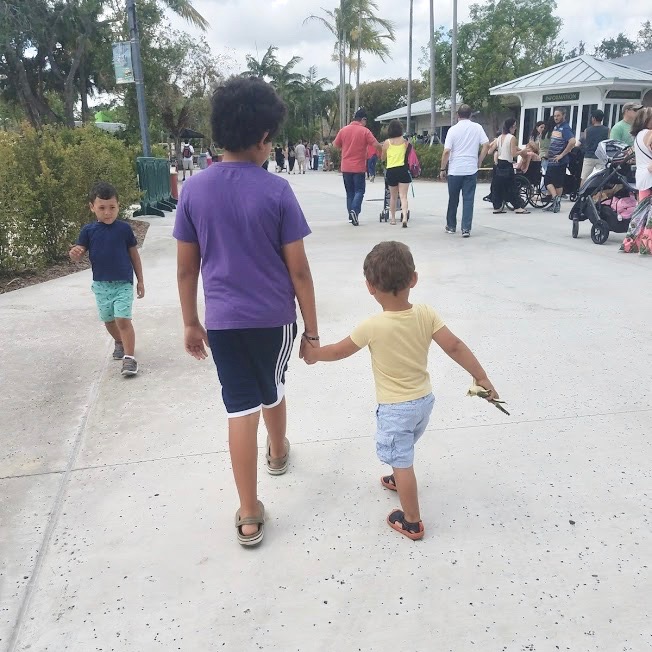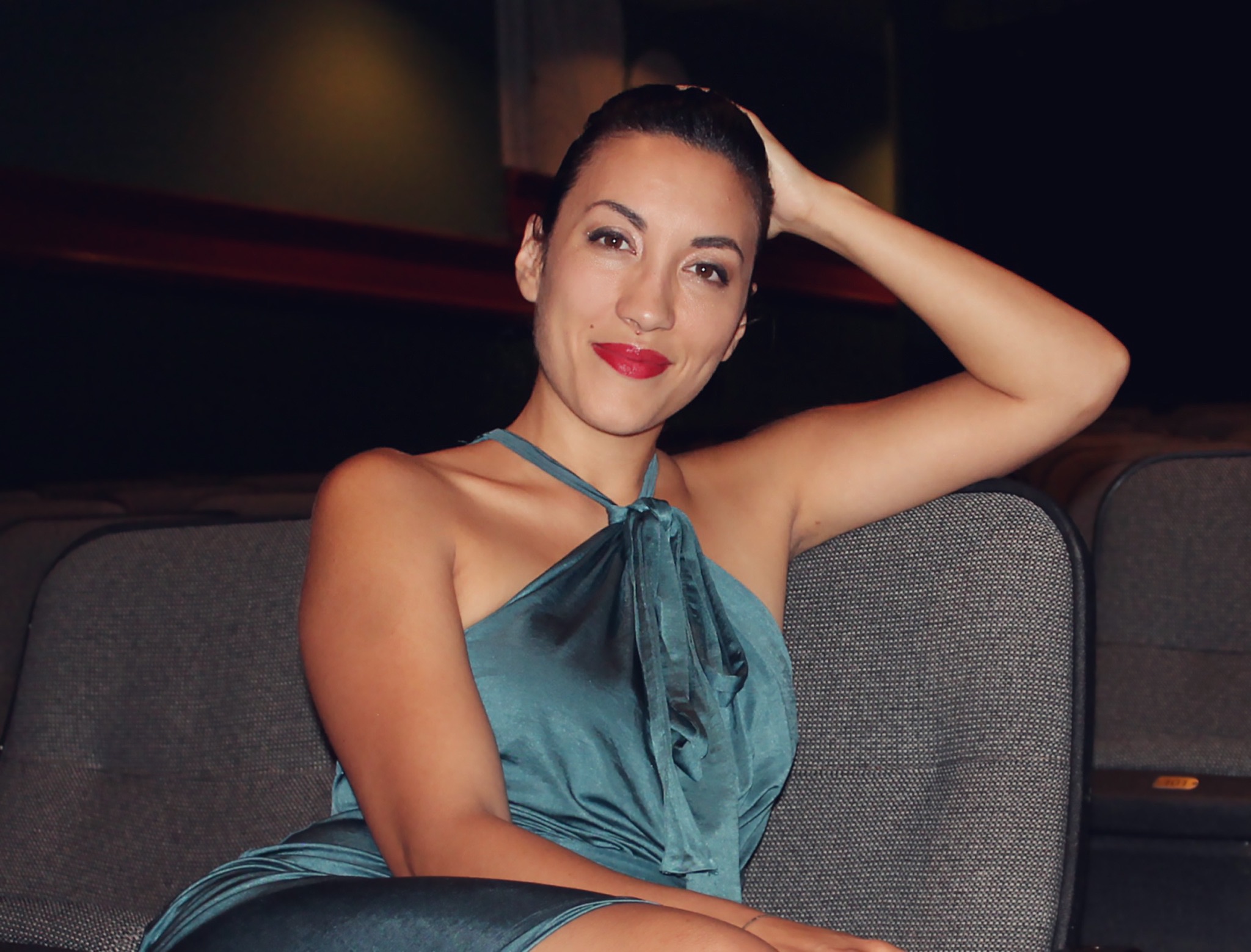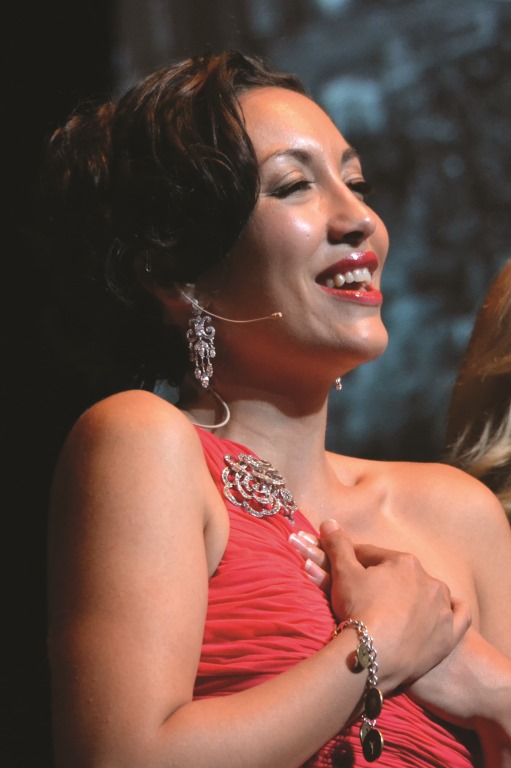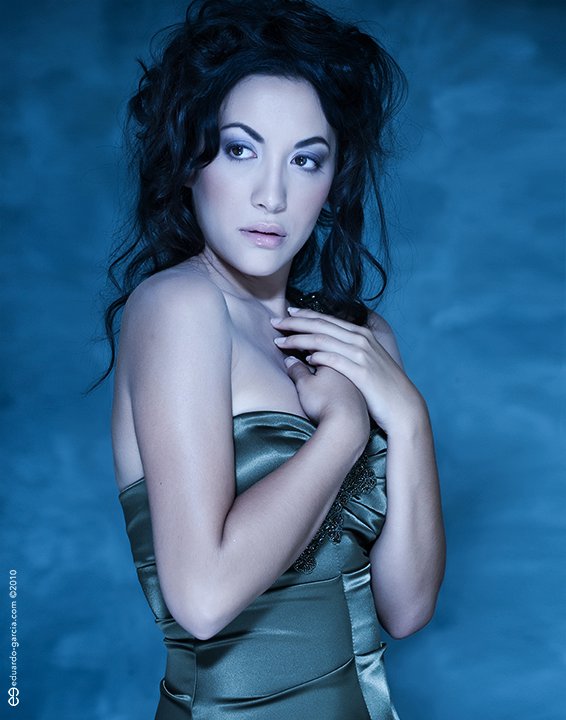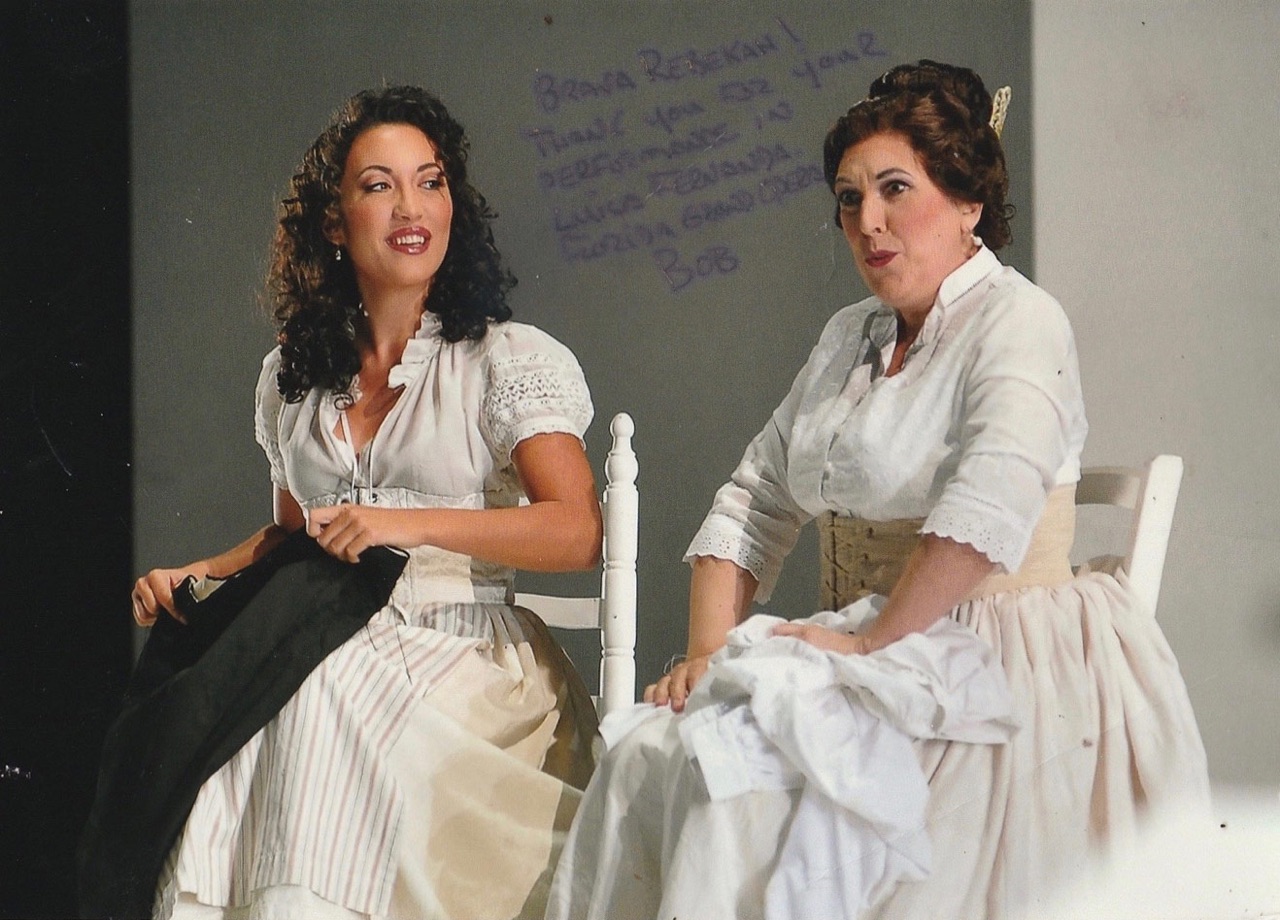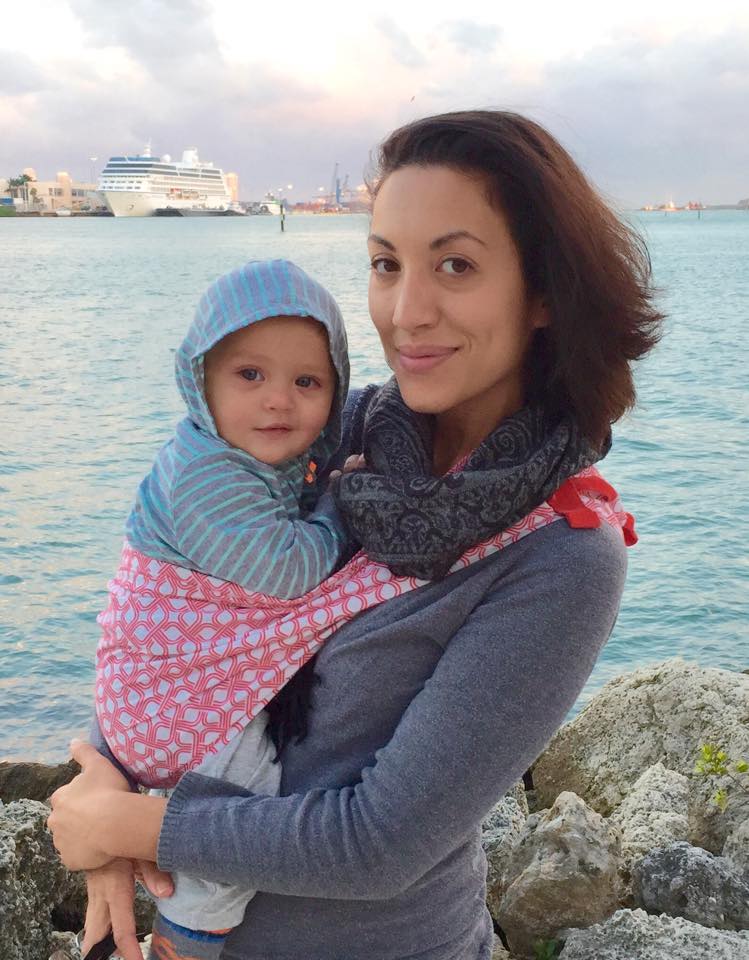Tell us about you and your family. I am married to Graham Fandrei. And we have three boys, ages nine, four and three. Marcello, who is my step-son, is nine, and he’s amazing. The four year old, Grayson, is four going on 25, and the three year old, Merrick, is three going on baby. So I have two extremes! One wants to go out for quiche, and the other one is eating bugs off the floor.
We live in Pinecrest, Florida—the suburbs of Miami—which is really interesting, because I did not grow up in the suburbs! I grew up in the Bronx, so it’s very, very different.
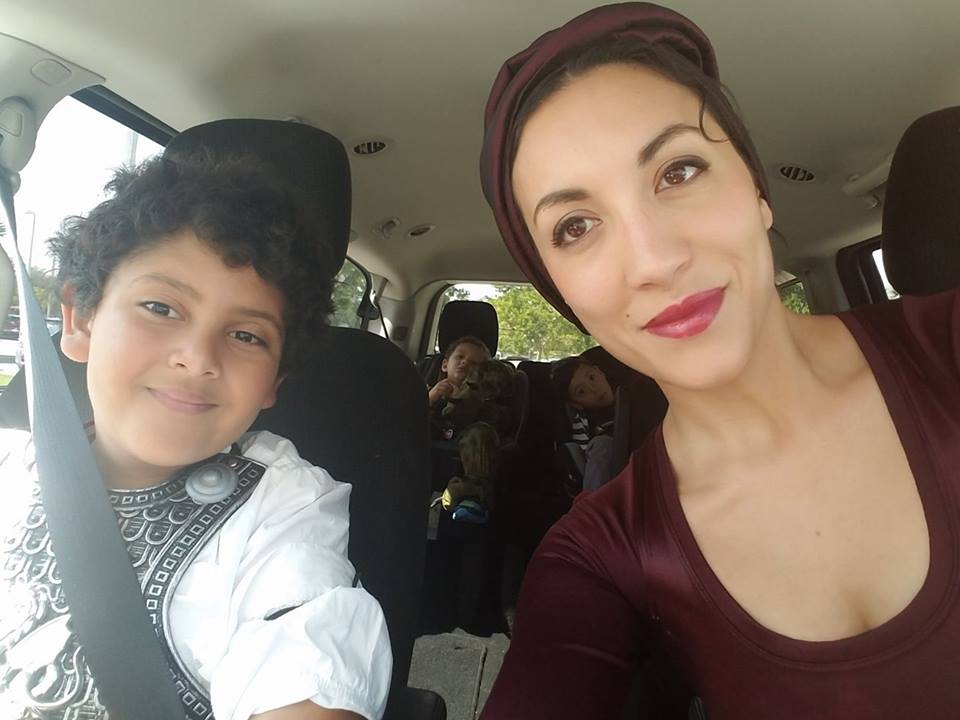
Was that a conscious choice you made, to live in the suburbs vs. the city? Yes, mostly because in Miami, the school system is such a challenge. As the little guys are getting to elementary school ages, we want to be somewhere where we can send them to the local schools and a good school system. As you know, artists don’t have a lot of cash to be sending their kids to private school, so we made a very conscious choice to move here. Plus, Graham is from here. His parents live five blocks from us, and they are close enough that if we need them they can help out.
Tell us about your work as Director of Education and Community Engagement at the Florida Grand Opera. Before I got this job at FGO, I was singing full time, and I still do sing quite a bit. But what I do now at FGO is direct the department of education and community engagement. I do actually a lot of directing, putting a lot of shows together and truncating operas into smaller operas. We take out all the fun parts of the opera and pull out the recitative to make it into dialog, usually translating it into English. We go out to schools, community centers, outdoor events, little theaters around south Florida, and bring opera to people on their level.
I also do a lot of work with disenfranchised groups. We work with girls rescued from human trafficking, basically giving them a therapeutic all-inclusive atmosphere, with education in opera and backstage chores, and we have a lot of parties to get them normalized. I do a lot of innovative programming to help people through opera. So, those are my two hats, which is kind of amazing.
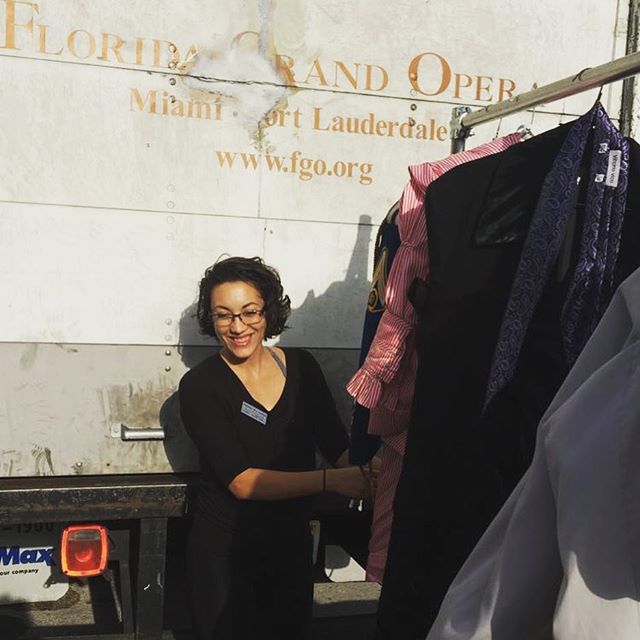
You’re only in your second season in this position at FGO, and you’ve already created some really innovative programming for the company. How did you come into this position? It was a conscious decision to leave singing full time after having the boys, and I was trying to find something that would keep me home more. I never dreamed that this position would be available, because it includes so many things that I love. I had interned under the previous person who had the job, and when I came into the position, there were a lot of holes in the program, for various reasons. It was very education focused, and there wasn’t a great emphasis on how opera could really affect change.
“I came from a very disenfranchised family in the Bronx, and opera kind of pulled me into a new life.”
I came from a very disenfranchised family in the Bronx, and opera kind of pulled me into a new life. And because of that experience, I wanted to revise the programing to do the same for other people. And not just for disenfranchised people—although we do a lot of that—but for anybody, because you never know what might inspire you to make that choice you never made, or take that trip you didn’t take, or change your life around. I took the programming, and added a lot of things that could make it very individualized and very personal. To make people interested in opera at a personal level.
I never knew how much I would love it. It’s funny because I sang professionally for well over 10 years, and I thought, this is it, there’s nothing else I want to do. Now that I’m doing this, it’s so great.
What is your favorite part of your job? My favorite part of my job is getting the chance to reach so many people. I get a chance to be so social and so helpful and interact with people at a micro and a macro level. For instance, today I had a young girl in my office who is part of our Cadenza program, which is where we work with girls involved in human trafficking. She came in the program and was very quiet and didn’t say anything for the first couple months. Through time, she’s become really involved with our opera company and now she’s interning with us. She had a really rough homelife with absentee parents and through this program and her work with FGO, she took steps to emancipate herself and get her degree. And had I not worked here at FGO, I would have never met this fantastic young lady.
On the other end of the spectrum, I work a lot with the Crescendo Circle program, which is a program for young professionals. We do really fun social events where, for example, we’ll present a cool opera mashup at a great night spot. I love reaching all of these different people at different levels, and hopefully touching them in some way.
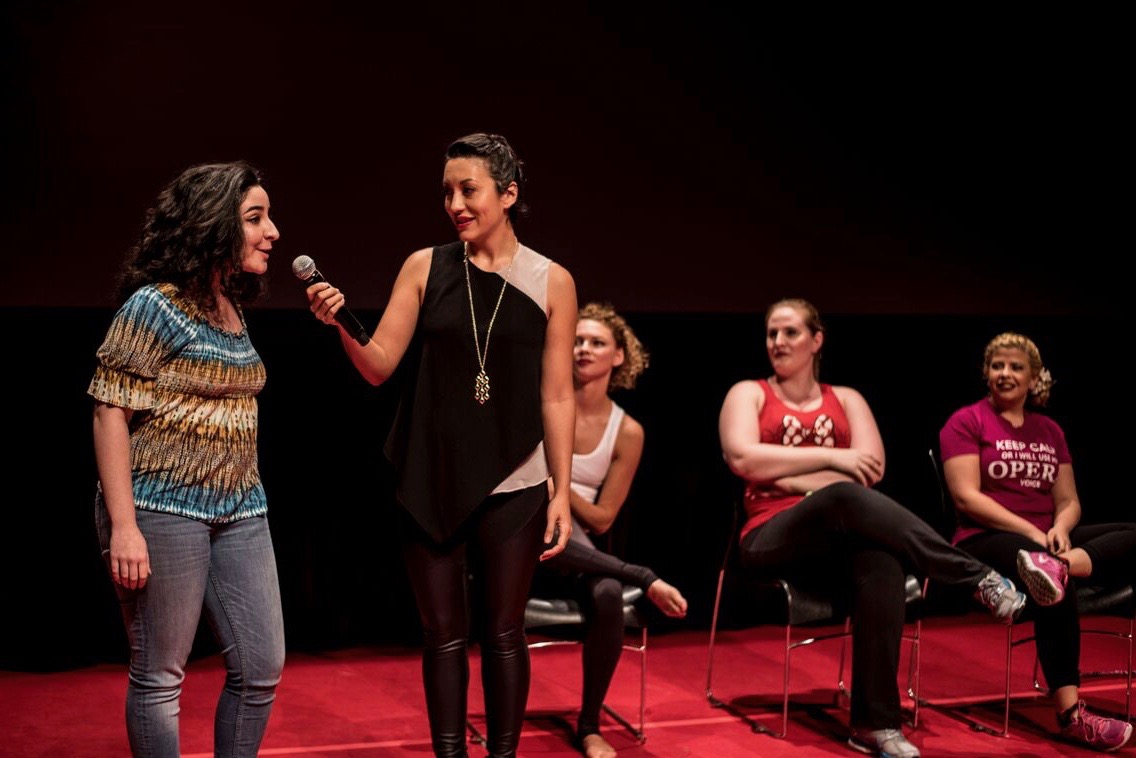
Was the Cadenza program—using opera to help girls involved in human trafficking—something that was already in place before you arrived? No. It was an idea that I came up with by accident. The first week that I was working at FGO, I was at a meeting for an organization in Miami called the Women’s Fund, which helps women and girls through grants and research. After the meeting there was a call for everyone to get out their checkbooks and donate. And I said, “I don’t have any money! But I will promise that I will do something!” They asked me to come to a meeting and talk about how opera has helped me in my life.
This meeting was for girls that were involved in human trafficking, and there were a lot of people from the court system there. They asked if I would come and create programs for the girls, and I said “I’ll do even better. I’ll create a program with the girls all year.” My boss approved the program, and now it’s growing. Next year, we’re expanding it to do the exact same thing with an organization for children of incarcerated parents, and with another organization for girls who become pregnant or give birth while in high school. It’s been great, and it’s all through opera.
“When you’re studying you think it’s all about technique, but I’ve learned that 75% of it is your personality and your ability to reach people, and 25% is about how you sound.”
What types of performances are you involved in? I do a lot of concerts, and I sing a lot for my husband’s company, Magic City Opera. We do small performances, and usually there’s a cocktail included with admission. Audiences are encouraged to talk to their neighbors and be social.
When you’re studying you think it’s all about technique, but I’ve learned that 75% of it is your personality and your ability to reach people, and 25% is about how you sound. When you’re doing an opera, there’s a lot of pressure to learn a new language, receive good reviews, etc. But the audiences I perform for now really want to hear more about who the performers are and how are they are making music reach people.
What was your professional training, and what were your aspirations before you got this job? I studied classical voice and musical theatre at Carnegie Mellon University and Manhattan School of Music. I was the first in my family to go to college on both sides and going to school for music was a big deal. My family thought it was crazy. But I was going to be an opera singer and that’s all I ever wanted to do. I spent six years in college and then right out of college I got my first young artist program at Sarasota Opera.
I did all of the stuff you’re supposed to do, and I ended up going really far with it. I wound up singing with Plácido Domingo here at Florida Grand Opera on a Main Stage performance. And then I got my first big international gig to go to Colombia and sing for the Festival Internacional de Música de Medellín, singing Beethoven’s ninth symphony and the Bachianas Brasileiras by Heitor Villa Lobos. It felt like the of the top of my career, and I was thinking this is it, this is the one. And I should have been thrilled, because it was everything that a young singer wants, but I was five months pregnant at the time, and I just wanted to go home. I knew that my mind was changing a little bit at that point.
Was your first pregnancy a planned pregnancy? Yeah, the first one was planned. Graham and I were dating for almost a year and a half and we didn’t want to get married at the time, but we knew we wanted to have a kid. At the time, you could not be gay and get married, and that was a really important thing for me. I didn’t want to get married personally until everyone could get married. But he asked me if I would want to have a child with him and I said yes.
We got pregnant really fast. Everyone said it takes a long time, but we got pregnant within a month, which was a big shock. I didn’t think much of it at first; it was still so surreal. I just kept living my life, doing my things. You have to book so far in advance as an opera singer that I still had a full eighteen months of performing that I had booked when I found out I was pregnant with Grayson.
So of course, initially I went crazy because I would have to think about which gigs would be impacted. For this gig they’re going to get pissed off because I’m a little pregnant and they don’t want that. For a singer, it’s hard because you do run into those types of situations. I had a concert when I was almost nine months pregnant, and the lady who was in charge was really not happy because in her mind she couldn’t conceptualize the fact that I was doing this concert of love songs with a big pregnant belly. She wanted me to be this young ingénue character. And so she tried to not-so-cleverly hide my baby bump with all of these very creative costuming choices, with tying things around my belly. Graham and I were performing together for this concert, and as I mentioned, we were not married. She had a big problem with that, so she made me wear a giant costume ring on my finger on stage to show that we were married. She made me jump through all of these hoops.
“I know no one wants to talk about it, but I totally had postpartum depression…It was really hard to find my way back. I would feel like, ‘It’s two in the morning and I’m nursing this kid, and this is all I am anymore. I’m just a mother who’s taking care of this baby.’”
How was your transition into motherhood once you had Grayson? I had an all-natural birth with my first child, and that was not my plan, but I didn’t have insurance at the time. I had a horrible time afterwards. I know no one wants to talk about it, but I totally had postpartum depression. I was a singer full time and then I had this baby and I thought I would go right back out there and start working again. That didn’t happen. I ended up staying home with him for two years. It was really hard to find my way back. I would feel like, “It’s two in the morning and I’m nursing this kid, and this is all I am anymore. I’m just a mother who’s taking care of this baby.”
The days kind of go on and on, and it’s hard to find people to talk about that. With Merrick, my second child, I had to have a c-section because my husband is 6’4” and that child was enormous, and he was lodged into my body, and they had to get him out. Because of that I actually had a better time, because there was more care at the hospital, more people checking in on me. It’s important to have a network of people who remind you that you’re not alone and there are people out there going through this. You’re going to get through it and it’s going to be okay.
I had one friend, an actress, and she would call me up when I was at my lowest and say, “Grab your kid, we’re going to the wine bar. Just bring your kid.” And I would say, “I can’t. He’s going to cry the whole time!” And she’d say, “Fuck them! It doesn’t matter, you’re paying for that wine, bring him!” She had this sweet little daughter that was always good, and mine was pulling things off the table. She got me through so much because she was another person who said, “That’s what it is to be a new mom. It’s tricky and you have to find your path.” And there’s no right path.
Your boys are only fifteen months apart. What was it like, finding out you were pregnant for the second time so soon? After I had Grayson, I still performed, because having one child and performing was doable. I had a performance that was lined up when he was five months old, and I brought him with me, brought him backstage, and everything was fine. But that same day I found out I was pregnant with his little brother, which was a very, very, very big surprise. I was like, “Oh my god. I have a five month old and I’m going to have another kid.” My husband was thrilled; he was so happy. Meanwhile, I’m like, “Oh my god, I hate you, I can’t believe you’re happy.”
After I got pregnant with Merrick, we decided to get married, here, on the steps of the Doral Opera Center. We both had sung with the company so much that we decided to get married here, because opera brought us together. I was probably about three months pregnant at the time. After that I just didn’t want to be traveling with two young kids. I do a lot of concert work locally because I’ll be gone for a couple of hours, and then I’m done. But with opera you’re always on the road, constantly going. It was a very hard choice because it’s so much of who you are, and you feel like you’re abandoning yourself.
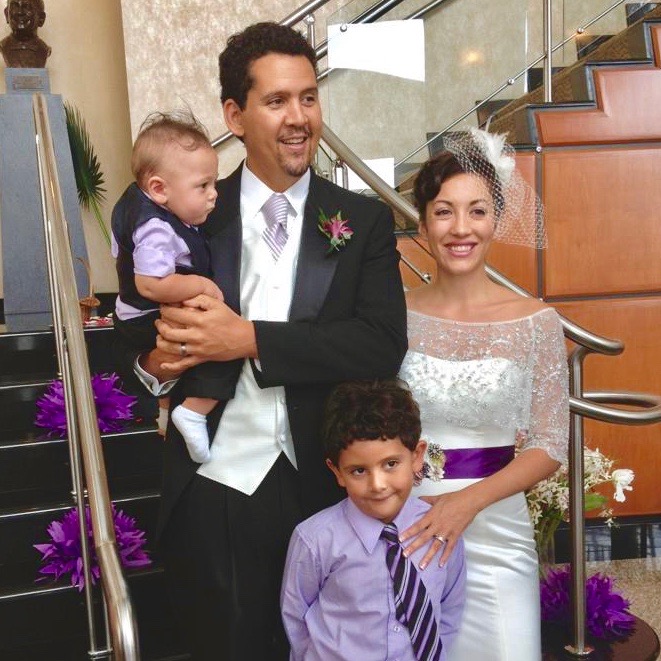
I started directing more when Grayson was about seven months old and I was pregnant with Merrick. I had a contract to direct at a very small production company, and I remember I was directing a gala performance for the Humane Society. There’s a great video of this, where I have this big pregnant belly, and I’m holding Grayson on my shoulder, because I had no one to watch him, and I was trying to direct this scene with one baby on my shoulder, one baby in my stomach, and in that moment I really realized that I enjoyed directing more than singing. And the singing wasn’t enough for me to keep going and finding those opportunities. So I started to think about how I could switch over to directing while continuing to sing, and also make enough money. Because being an artist is not the most cost-effective way to raise a family, unfortunately.
Would you say finding this position has been a game-changer for you? Yeah, it really has. All of the things that I loved about singing are still present in this job, because what I loved most about singing was reaching people. I have always been a very in-my-head type of person, so a lot of singing was a pain for me because I was always worrying, do I sound all right today? Am I pronouncing this word correctly? But I have always loved the outreach aspect. I love reaching people. I love a little old lady coming up to me after a concert with tears in her eyes talking about how she remembers that song from when she was a kid. Finding those aspects is what I do a lot of now. I get to touch people, and reach people, and make things special for people on a very direct level. I love it.
How do you find balance between having a full time career and being a parent? That is the million dollar question, isn’t it! There are a lot of things I wish I was doing better, I’ll be honest about that. It is hard to balance, I think especially for women working in the arts. Prior to children, you give so much of yourself as it is, that you wind up identifying with that. You put so much of yourself into your art that when you have to start compartmentalizing your art, finding little places to divvy out your time, it gets to be a challenge.
Personally, I was worried about losing who I was. Having children has always been one of my greatest goals in life, and I want to be with them 24 hours a day. I don’t want to ever be away from them. I want them with me constantly. So I feel like an important thing that I would tell anyone who’s moving from a position of high art to having children is to embrace the change. You have to accept that this is just the new way of doing things and give yourself a break.
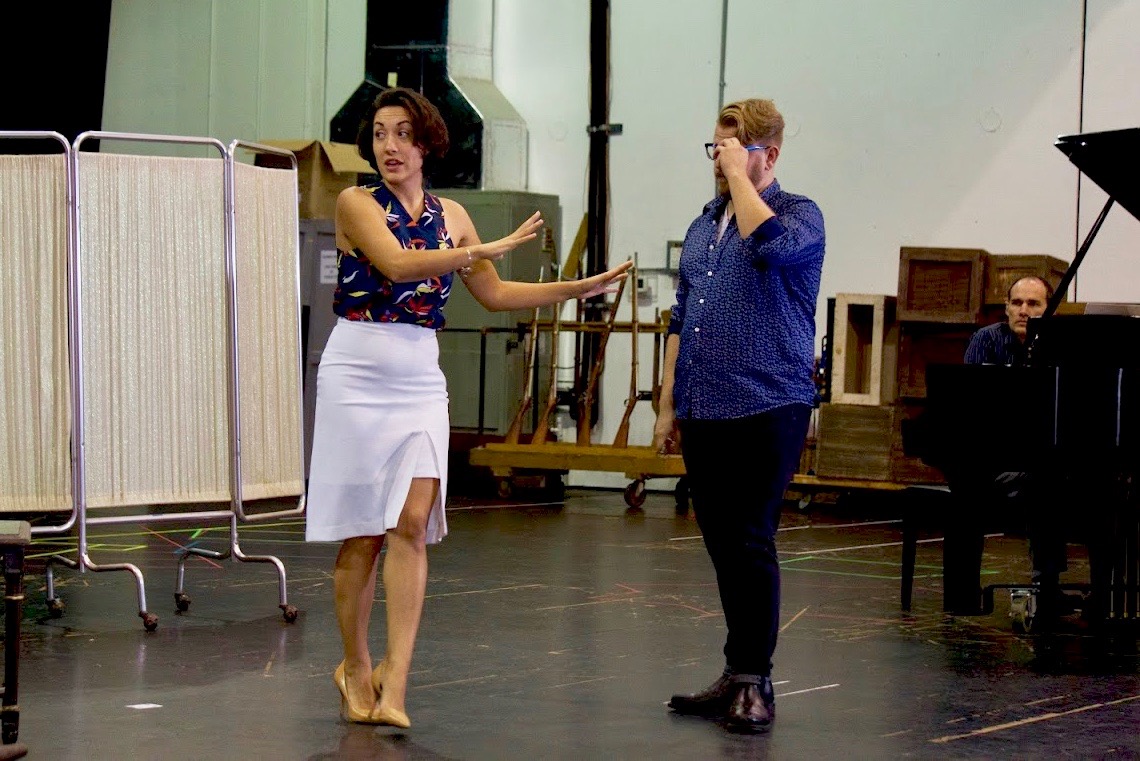
Yes. As women and mothers, always taking care of others, we need those reminders to find space in our lives for breaks. How have you managed to do that in your life? At first, I didn’t give myself a break at all. I wanted to be able to do it all. I wanted to clone myself, and be there with my kids all the time, and be at my job all the time, and be singing all the time, and I would wind up giving myself undue stress. Now, I am very lucky that my boss is a woman who is very supportive of me. My kids are always welcome in the office. They run up and down the hallway and destroy everything and nobody really cares, which is great. If I ever had a major emergency I could leave.
It’s still hard because I do work basically a 60 hour week, with events in the evenings and on weekends. So when I do have time with the boys, I try to make it really count. Whenever there is that time, we’ll do something that’s meaningful for each of them. Whether it’s a personal date, or they want to go do something, or if we all go in the backyard and jump around in the sprinklers, I try to make sure that there’s not a lot of TV time or “Go play, I’m tired and I need a cocktail” (and let me tell you, I do need a cocktail). Instead we do things together and try to make the time we have count. But, I still wish there was more time.
“I’ve seen a lot of parents pushing the stereotype of what a boy is supposed to be. My kids are extremely rambunctious; they break things, and they have their “boy” fits where they throw things and they eat dirt, but they are also very sensitive. They love the arts, and they can sit through concerts.”
What do you do for childcare while you’re at work? The boys go to a daycare that’s art-based, which is cool. It’s a Regio Emilia style school, so everything they do is based on art. They love it. It’s expensive, but they love it.
Your kids are around singing and the arts all day, every day. How do you see that manifesting in their personalities? They are so inundated with opera, and my four year old especially has become an opera expert. He sings constantly, and he has an “opera” voice that he does. They recognize all the local performance spaces. Now when I pick them up from school, Grayson’s teacher always has a video of him singing to the class. He’ll sing almost a recitative, and he’ll make up songs in his opera voice.
Music is on in our house a lot. They dance, they sing, they bang on the piano, and the fact that they are boys is really wonderful. I’ve seen a lot of parents pushing the stereotype of what a boy is supposed to be. My kids are extremely rambunctious; they break things, and they have their “boy” fits where they throw things and they eat dirt, but they are also very sensitive. They love the arts, and they can sit through concerts. I think being around artistic people and people of different kinds of backgrounds has been great for them.
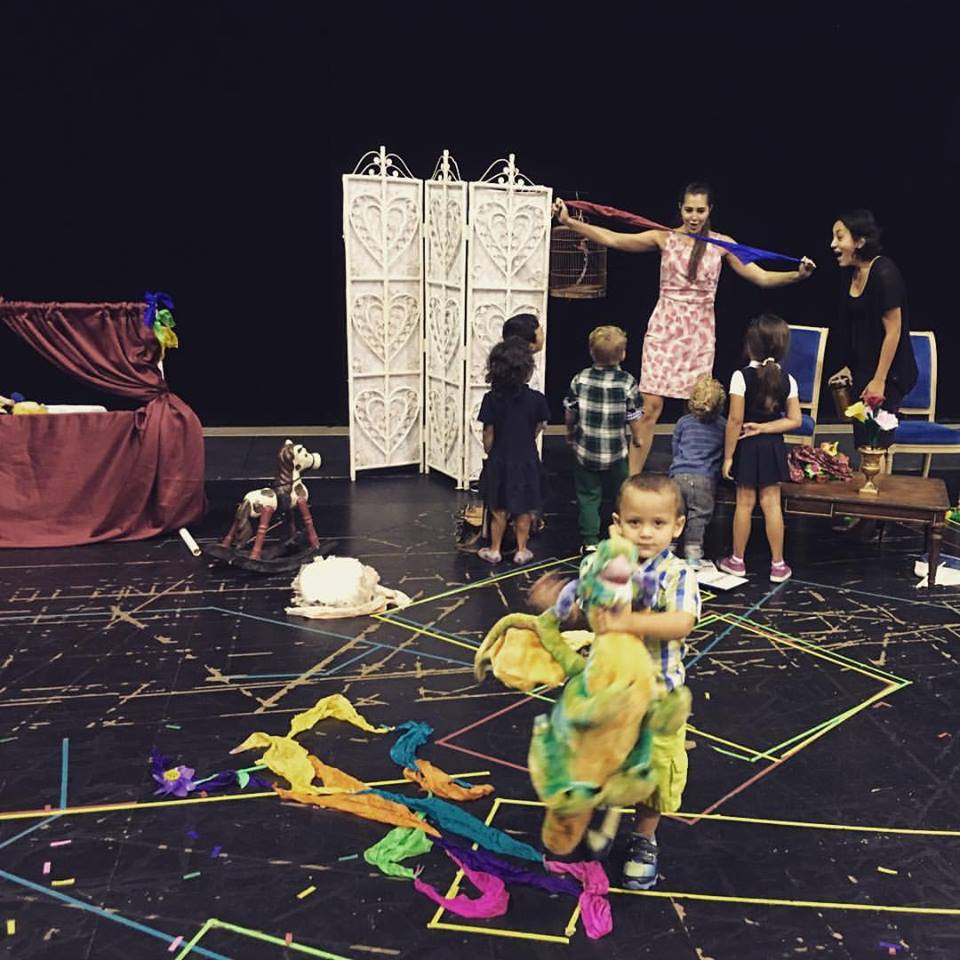
I was just talking about that very thing with a friend of mine, who has two daughters and a boy in the middle. And her son is in heaven when he’s in dance class, but he’s three years old and he’s already getting teased. What do you say to parents who are raising boys that are drawn to the performing arts? I’m lucky that Grayson is extremely outgoing, and a lot of kids at school imitate him and want to be like him. Marcello, my stepson, has also grown up in the arts because his mother is an actress. I think it really is a matter of putting kids with other like-minded kids, while still reiterating the fact that it’s okay to be different. You might as well be who you want to be and not try to conform. We’ll see what happens when my boys are teenagers. For now, it’s a little easier, I can just pick them up with one arm and say, “Let’s get the hell out of here.”
What do you love most about being a mother? I love seeing the things that my kids do that surprise me every day. It’s the joy they find in seeing new things. Grayson will see a butterfly and because it’s the 21st century he’ll say, “It’s a butterfly! Get your phone out and take a video of that butterfly!” He loves “egg pie,” which is quiche. That’s his new favorite thing now. It’s those cute little things that they do that bring you back in the moment. You see how they just find joy in a moment.
“I do think that we live in a society where it’s already so hard to be a woman, let alone a mother, let alone a mother who has other passions in life…I think that knowing there’s a group of women out there who are similar to you is so helpful.”
Do you have any advice for other Mother Makers out there? When I saw the Mother Maker page on Facebook, I was immediately drawn to it, because I do think that we live in a society where it’s already so hard to be a woman, let alone a mother, let alone a mother who has other passions in life. You’re never enough. I think that knowing there’s a group of women out there who are similar to you is so helpful. It is so encouraging to see that there are so many mothers out there who have done such important things, and who are passing on the arts to their kids and hopefully changing a lot of this crazy shit going on in the world right now. I’m really glad that you’re collecting all of those stories in one place so that people can see them.
